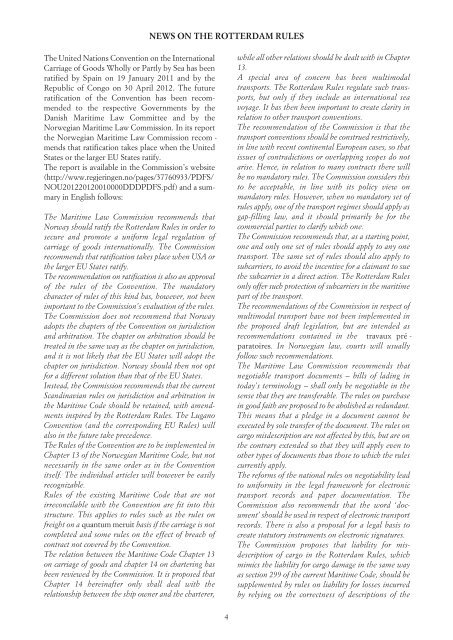CMI Newsletter n° 1 - Comite Maritime International
CMI Newsletter n° 1 - Comite Maritime International
CMI Newsletter n° 1 - Comite Maritime International
Create successful ePaper yourself
Turn your PDF publications into a flip-book with our unique Google optimized e-Paper software.
<strong>CMI</strong> News 2012-1_1 2012 18/06/12 16.22 Pagina 4NEWS ON THE ROTTERDAM RULESThe United Nations Convention on the <strong>International</strong>Carriage of Goods Wholly or Partly by Sea has beenratified by Spain on 19 January 2011 and by theRepublic of Congo on 30 April 2012. The futureratification of the Convention has been rec om -mended to the respective Governments by theDanish <strong>Maritime</strong> Law Committee and by theNorwegian <strong>Maritime</strong> Law Commission. In its reportthe Norwegian <strong>Maritime</strong> Law Commission rec om -mends that ratification takes place when the UnitedStates or the larger EU States ratify.The report is available in the Commission’s website(http://www.regjeringen.no/pages/37760933/PDFS/NOU201220120010000DDDPDFS.pdf) and a sum -mary in English follows:The <strong>Maritime</strong> Law Commission recommends thatNorway should ratify the Rotterdam Rules in order tosecure and promote a uniform legal regulation ofcarriage of goods internationally. The Commissionrecommends that ratification takes place when USA orthe larger EU States ratify.The recommendation on ratification is also an approvalof the rules of the Convention. The mandatorycharacter of rules of this kind has, however, not beenimportant to the Commission’s evaluation of the rules.The Commission does not recommend that Norwayadopts the chapters of the Convention on jurisdictionand arbitration. The chapter on arbitration should betreated in the same way as the chapter on jurisdiction,and it is not likely that the EU States will adopt thechapter on jurisdiction. Norway should then not optfor a different solution than that of the EU States.Instead, the Commission recommends that the currentScandinavian rules on jurisdiction and arbitration inthe <strong>Maritime</strong> Code should be retained, with a mend -ments inspired by the Rotterdam Rules. The LuganoConvention (and the corresponding EU Rules) willalso in the future take precedence.The Rules of the Convention are to be implemented inChapter 13 of the Norwegian <strong>Maritime</strong> Code, but notnecessarily in the same order as in the Conventionitself. The individual articles will however be easilyrecognizable.Rules of the existing <strong>Maritime</strong> Code that are notirreconcilable with the Convention are fit into thisstructure. This applies to rules such as the rules onfreight on a quantum meruit basis if the carriage is notcompleted and some rules on the effect of breach ofcontract not covered by the Convention.The relation between the <strong>Maritime</strong> Code Chapter 13on carriage of goods and chapter 14 on chartering hasbeen reviewed by the Commission. It is proposed thatChapter 14 hereinafter only shall deal with therelationship between the ship owner and the charterer,while all other relations should be dealt with in Chapter13.A special area of concern has been multimodaltransports. The Rotterdam Rules regulate such trans -ports, but only if they include an international seavoyage. It has then been important to create clarity inrelation to other transport conventions.The recommendation of the Commission is that thetransport conventions should be construed restrictively,in line with recent continental European cases, so thatissues of contradictions or overlapping scopes do notarise. Hence, in relation to many contracts there willbe no mandatory rules. The Commission considers thisto be acceptable, in line with its policy view onmandatory rules. However, when no mandatory set ofrules apply, one of the transport regimes should apply asgap-filling law, and it should primarily be for thecommercial parties to clarify which one.The Commission recommends that, as a starting point,one and only one set of rules should apply to any onetransport. The same set of rules should also apply tosubcarriers, to avoid the incentive for a claimant to suethe subcarrier in a direct action. The Rotterdam Rulesonly offer such protection of subcarriers in the maritimepart of the transport.The recommendations of the Commission in respect ofmultimodal transport have not been implemented inthe proposed draft legislation, but are intended asrecommendations contained in the travaux pré -paratoires. In Norwegian law, courts will usuallyfollow such recommendations.The <strong>Maritime</strong> Law Commission recommends thatnegotiable transport documents – bills of lading intoday’s terminology – shall only be negotiable in thesense that they are transferable. The rules on purchasein good faith are proposed to be abolished as redundant.This means that a pledge in a document cannot beexecuted by sole transfer of the document. The rules oncargo misdescription are not affected by this, but are onthe contrary extended so that they will apply even toother types of documents than those to which the rulescurrently apply.The reforms of the national rules on negotiability leadto uniformity in the legal framework for electronictransport records and paper documentation. TheCommission also recommends that the word ‘doc -ument’ should be used in respect of electronic transportrecords. There is also a proposal for a legal basis tocreate statutory instruments on electronic signatures.The Commission proposes that liability for mis -description of cargo in the Rotterdam Rules, whichmimics the liability for cargo damage in the same wayas section 299 of the current <strong>Maritime</strong> Code, should besupplemented by rules on liability for losses incurredby relying on the correctness of descriptions of the4
















